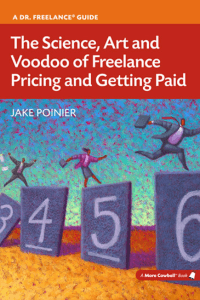 Dr. Freelance: I was approached by a successful entrepreneur and aspiring author who’s written a massive book about his industry. I initially gave him my editing rates in an hourly rate (a mistake, I know!), and he asked me to calculate a project fee based on the document as it stands. Well, my estimate was about 25% above his budget, and now he’s asking me to lower my rates. (He still wants me to edit the book, based on my own experience in his industry and the editing sample I sent him.) The challenge is that he wants more than just copyediting: He wants to cut out a lot of fluff, and there are some organizational issues I’d need to address as well as cleaning up the manuscript. I truly believe that my estimate is fair, but I’m torn between wanting the gig and needing to stand my ground.—What’s My Next Move?
Dr. Freelance: I was approached by a successful entrepreneur and aspiring author who’s written a massive book about his industry. I initially gave him my editing rates in an hourly rate (a mistake, I know!), and he asked me to calculate a project fee based on the document as it stands. Well, my estimate was about 25% above his budget, and now he’s asking me to lower my rates. (He still wants me to edit the book, based on my own experience in his industry and the editing sample I sent him.) The challenge is that he wants more than just copyediting: He wants to cut out a lot of fluff, and there are some organizational issues I’d need to address as well as cleaning up the manuscript. I truly believe that my estimate is fair, but I’m torn between wanting the gig and needing to stand my ground.—What’s My Next Move?
WMNM: The positive news is that you’re in a reasonably good negotiating position. The author didn’t flinch at the original editing rates in your proposal, but clearly didn’t recognize how much work the manuscript required. (Not an uncommon syndrome among novice authors.) He also liked your sample edits and experience. As a result, you’re starting from a stronger position than you may have thought—and you don’t have to play the how-low-can-you-go limbo.
Let’s talk, then, about how to move the negotiations forward. From your description, he may have a hard cap on his budget, and it could be fruitless to try to convince him to go for your full price. If you think there’s some wiggle room, I suppose you could counter with something halfway between his budget number and your estimate. That’s your call. But the most important strategic consideration is…
Don’t Just Lower Your Editing Rates
A better play, in my opinion, is to counter with something along the lines of “I can work within your budget of $XXXX, but it is going to limit the thoroughness of the edit, because I’ll need to work at faster rate per page. The focus will need to be more along the lines of fixing grammar, sentence structure, etc., and less on the developmental recommendations and fluff-cutting. Of course, at the end of the process, you will still have a clean, professional, high-quality manuscript.”
For the author to get the most out of his budget, you might suggest that he do some of the cutting and reorganizing himself before you start working your editorial magic. Honestly, that will also make life easier for you, since you’ll have a better idea of what’s important to him—since he’s choosing what to cut and the order in which content appears, etc.
Now, I have a few caveats:
- I recommend delivering that message via a phone conversation rather than email. That way, you can gauge his reaction, and hone your pitch accordingly as you proceed. Otherwise, you may have additional rounds of back-and-forth emails before you come to an agreement on terms.
- If the author agrees to the work-within-his-budget approach, you need to be careful to stick to your outlined approach. You’re going to be tempted to deliver all of the editing services you proposed at the outset, but that’s no longer the deal! Don’t let your perfectionist streak overwhelm your business decision to pare back the amount of service in exchange for a lower overall fee.
In the comments: Rather than lowering your editing rates, what’s your favorite approach to negotiating a fair deal when a client has a limited budget?
 The Science, Art and Voodoo of Freelance Pricing and Getting Paid offers a more detailed explanation of how to calculate your rates, deliver persuasive estimates, and gain leverage in negotiating situations with potential freelance clients.
The Science, Art and Voodoo of Freelance Pricing and Getting Paid offers a more detailed explanation of how to calculate your rates, deliver persuasive estimates, and gain leverage in negotiating situations with potential freelance clients.
Already read it? Please take a few minutes to write up a review on Amazon or Goodreads—thank you!
This is great advice. I had a somewhat related situation earlier this year, and ended up lowering my rates and regretting it and resenting the work a bit. Now I’ll have a plan for if that happens again! Thanks 🙂
Thanks, KeriLynn. I think we’ve all been in the “regret and resent” zone on occasion. The key is recognizing it and using preventive medicine!
I find I don’t mind working within a budget that’s lower than my price if I can basically do it at my own pace. So I ask if it would be feasible to push the deadline out. Then I can work on other more profitable projects more comfortably and I don’t feel resentful about doing work cheaper than I’d like, since I’m doing it on my own terms at least.
Shakirah, that’s definitely another solid negotiating option. Certainly something to consider if the client or author still wants the same level of services, but won’t budge on budget—*and* as long as it’s a project that fits your other criteria. Thanks for commenting!
Jake, you and Shakirah make equally good points. It’s hard to keep yourself from editing thoroughly, so ask the client to do some of the preliminary work such as removing or at least flagging material that can be eliminated. I find that clients almost always agree to extending the deadline in exchange for a lower fee. I’d rather have the money, but as Shakira points out, at least I’m not annoyed by the project every time I work on it. You do have to go into these negotiations with firm money and time boundaries. I’vet turned down projects because we couldn’t agree on terms, only to have the client come back later and agree. In freelancing, even a firm no can mean you’re still negotiating!
Hi Sheila–thanks for the comment. Yes, it’s definitely harder to dial back editing skills than to deal with a cleaner doc. And you’re right about what I call boomerang clients. If you’ve sold someone on your VALUE (not just your price), the door is always open!